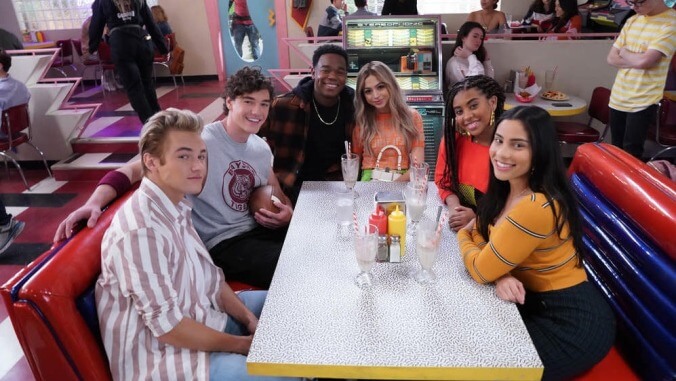It’s a long-winded setup, but a necessary one. Because Great News creator Tracey Wigfield’s vision of Saved By The Bell 2020 wouldn’t work with another Zack at the helm. Yes, there is another Zack roaming Bayside’s halls—Mac Morris (Mitchell Hoog), son of Zack and lover of babes—but don’t expect the gritty Riverdale treatment. Mac is Zack, but dumber and nicer to nerds. His best friend (and occasional rival) is Jamie Spano (Belmont Cameli), a blend of Mario Lopez’s Slater and Tommy D from The New Class. Their Lisa Turtle is Lexi (Josie Totah), a transgender fashion icon with her own reality show, Becoming Lexi: I Am Me. Together, they cook up schemes, lust after love interests that disappear after a single episode, and make life hell for the long-suffering Principal Toddman (John Michael Higgins), who’s every bit as sweet and doofy as Mr. Belding. But they are not our protagonists. They are, in the eyes of the school’s new transfers, dopey, seemingly unknowable specimens ensconced in a world unencumbered by class struggle or meaningful consequence.
It’s through these transfer students—Daisy (Haskiri Velazquez), Aisha (Alycia Pascual-Pena), and Devante (Dexter Darden)—that we view Bayside with a kind of awed bemusement. And therein lies the ingenuity of Wigfield’s vision: By shifting protagonists to Bayside outsiders, she and the writers are able to resurrect the weird, reality-detached charm and aesthetic of the original while also using it to show the absurdity of wealth through the eyes of the lower-class. This Bayside is a bubble, a satirical vessel for exploring how privilege resists change. And, without taking itself too seriously, the show mines this tension for stories that, by and large, feel fresh in the realm of modern teen comedies. The poor kids struggle with their newfound privilege. They fear they’ll be stereotyped. They advocate for reform in a system that favors the rich. You’ll hear the occasional “bitch” or “damn,” but the show mostly sustains the original’s wholesomeness, delivering sweet, tween-friendly lessons about being true to yourself and giving others second chances.
But Saved By The Bell is also surprisingly funny, balancing its reverence for the original with satire that will no doubt speak to fans who grew up on the show. “You guys go to a sit-down restaurant every day? Isn’t that expensive?” Daisy asks Mac upon entering The Max, the local diner that looks almost exactly as it did in 1990. “Yeah,” he obliviously replies. Later, when Max (a returning Ed Alonzo) does a magic trick for the table, Mac lights up: “Damn, I love magic!” His genuine excitement, incongruous with the modern teen, speaks to what’s always been one of Saved By The Bell’s bizarre disconnects, that these virginal teens have the sensibilities, interests, and pop culture references of people from an entirely different time and place. Wigfield’s teens are absolutely creatures of 2020, but there’s a lot of fun to be had when her Saved By The Bell taps into that old, groan-worthy energy. “Why is your book upside-down?” Mac asks Jamie. “I’m reading about Australia!” Jamie replies, dumb smile shining.
The show’s humor doesn’t entirely exist in this tension. Wigfield, who won an Emmy for her writing on 30 Rock, infuses Saved By The Bell with the peppy, kinetic energy that distinguished her previous work. Not every actor keeps up the pace and some of the more modern references—Kardashians, Bieber, etc.—land with a splat, but, as with 30 Rock, it’s easy to forgive a dud when the jokes come so fast and furious. A good reference, too, is never far away—Jessie, for example, penned a book called I’m So Excited, I’m So Scared… To Become A Parent. Easy? Sure. Still funny.
Speaking of Jessie, Elizabeth Berkley Lauren, like Gosselaar and Mario Lopez, reprises her role as Bayside’s resident egghead. Jessie and Slater, as counselor and coach, respectively, serve as a bridge between the show’s dual worlds, stabilizing forces that ground Bayside in just enough of a reality to ensure it doesn’t entirely become a cartoon. It’s a delicate balance, after all. This entire endeavor is. Saved By The Bell isn’t remembered as a show so much as it is an aesthetic; it took a magician as good as Max to translate that to 2020 in a way that didn’t feel cynical or irreverent. Maybe Wigfield should open up her own diner.













![HBO teases new Euphoria, Larry David, and much more in 2026 sizzle reel [Updated]](https://img.pastemagazine.com/wp-content/avuploads/2025/12/12100344/MixCollage-12-Dec-2025-09-56-AM-9137.jpg)




























